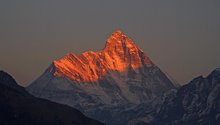
We all choose to live life differently. My philosophy is to live life as portfolio of goals. What that means is that one should think about some near term goals and some far term goals, and one should increasingly think about new and different things as the timeline for the goals increases. This has several advantages.
1. It allows us to gain a sense of achievement by accomplishing things in the short term. This is possible since by definition, the near term goals are in areas we are familiar with. For example - a mountain climber setting goals of climbing increasing challenging peaks. A sales agent setting increasing sales targets.
2. It allows us to believe there is ever changing diversity in our lives, which gives us a sense of hope and a direction to look forward to. It is said that till there is hope, there is life. Longer terms goals allow us to believe in this hope.
3. It allows us to renew ourselves. As I mentioned, the goals further out should be in areas less familiar to us. A sense of renewal, a sense of growth is important to our evolutionary senses. Growing out into new areas also allows us to build a broader network of people, which in turn increases our happiness quotient.
How can one start to think about this portfolio of goals?
Start with where you are. Lay out a couple of areas you are spending a lot of you current time (professional, personal), and lay out 2-3 year goals for yourself. This is your near term portfolio.
Next, think of 3-5 new things you've always wanted to learn or do. Again, these can be professional or personal, ideally both. Some can be related to your current portfolio, but some should be truly new, new things. Ofcourse, consider your skills and abilities as you do this, but remember, more often than not, limits exist in the mind!
Now that you have these 3-5 new things, arrange them in order of complexity, with the least complex closer out, and the most complex thing furthest out.
Determine a way for you to balance how you spend you time between your existing portfolio and your future portfolio. As a rule of thumb, try not to spend more than 80% of your time on your existing portfolio. This is very important so that your portfolio of goals can we progressively achieved and is not something that just remains on paper.
Finally, remember that this portfolio should be updated every 1-2 years (not any more frequent as it can be disruptive and lead to loss of focus).


